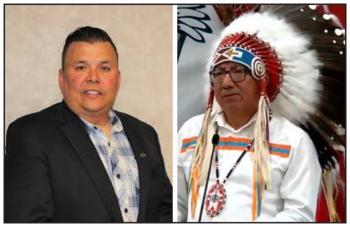Image Caption
Local Journalism Initiative Reporter
Windspeaker.com
Ron Quintal, president of the Fort McKay Métis Nation, is pleased with what could arguably be called the only substantial amendment from INAN, the all-party Standing Committee on Indigenous and Northern Affairs committee, on Bill C-53.
Today, INAN presented its report to the House of Commons on the Bill, An Act respecting the recognition of certain Métis governments in Alberta, Ontario and Saskatchewan, to give effect to treaties with those governments and to make consequential amendments to other Acts.
There were 10 amendments made on C-53 that now goes from 25 clauses to 26.
Clause 8, the Recognition clause, was amended to make the distinction between all Métis in the three provinces and Métis who choose to be represented by the Métis governments specifically named in the Bill.
Clause 8.1 reads, “For greater certainty, nothing in this Act is to be construed as abrogating or derogating from the right to self-determination of a Métis collectivity that has not authorized a Métis government…to act on its behalf, including the inherent right of self-government recognized and affirmed by section 35 of the Constitution Act, 1982.”
“It definitely addresses the fact that the Métis Nation of Alberta (MNA) won't be speaking for us,” said Quintal, who appeared before INAN on Nov. 9 to tell the committee that when the MNA government brought its constitution into force, “they basically claim(ed) all Métis in Alberta.”
“I think the biggest bone of contention for us was that (the MNA) continued to claim that they represent us, (that) they represent all Métis,” he said.
However, if the federal government supports this amendment, Quintal says it’s an indication that the Liberals take that distinction seriously.
“(If) they ensure that that's in the bill then we're absolutely going to support legislation going in that direction because then it opens the door for us, because the government is saying, “Yes, the Métis Nation of Alberta doesn’t represent you.’ That gives us the autonomy to be able to say, ‘Yes, we represent ourselves’,” he said.
However, concerns voiced by numerous First Nations in Ontario about the First Nations people and lands that they say the Métis Nation of Ontario is erroneously claiming, were not addressed in any amendments that came forward from the 15 days of hearings, which began Oct. 26.
In a statement provided to Windspeaker.com, the Chiefs of Ontario (COO) said the amendments to Bill C-53 addressed no fundamental issues put forward by First Nations, including COO, Grand Council Treaty No. 3, Nishnawbe Aski Nation, Wabun Tribal Council, Association of Iroquois and Allied Indians, and Assembly of First Nations.
“First Nations’ fundamental concern…is that the legislation creates illegitimate section 35 rights for the Métis Nation of Ontario (MNO) that MNO has no entitlement to,” said COO.
First Nations chiefs called for the Bill to be killed or for the MNO to be removed from the legislation. Neither happened.
“Canada’s current attempt to force through Bill C-53 will do nothing but damage First Nations’ rights for generations to come,” Nishawbe Aski Nation Grand Chief Alvin Fiddler told the committee.
He listed concerns with the Bill, including territorial rights asserted by Métis, future treaties with the Métis, and “undefined references to concepts such as mobility rights and activities incidental to harvesting.”
“I met with some chiefs when I was in Ontario to have conversations about their concerns and I absolutely understand why they were concerned,” said Quintal. “It's very similar to what the Métis Nation of Alberta has done here. They're claiming they own us or they represent us and then you have those communities in Ontario…and it creates a lot of controversy for those First Nations.”
In its statement, COO noted an amendment by INAN that there be at least a 30-day pause period on any treaty or self-government agreement coming into force. However, COO pointed out, the amendment includes no outline of “rigid processes” or specific action Canada is to take once INAN provides an analysis on the proposed treaty or agreement.
“All other amendments made within Bill C-53 are also either entirely irrelevant to First Nations’ concerns or do not address other substantial issues that have been raised, such as who exactly is being recognized in Ontario as having section 35 rights,” said COO.
INAN undertook seven meetings where the committee went through the Bill clause-by-clause with officials from Crown-Indigenous Relations in attendance to answer questions. Those meetings included numerous recesses so input could be received from Métis government representatives who were always present.
Amendments were restricted to those that limited the Bill rather than expanded the scope of the Bill, said John Aldag, chair of INAN and Liberal MP.
Progressive Conservative and NDP MPs joined chiefs and Métis, who did not represent the Métis governments that were the focus of the Bill, in condemning the Liberals for not effectively and fully consulting before introducing Bill C-53.
Conservative MP Jamie Schmale accused the government of creating division among Indigenous people with the Bill.
“It’s truly unfortunate, especially given the extra time they had to work on this Bill. How many months had they promised to table this Bill? And it never came forward. Only to be tabled at the last second before we recessed in June. It’s extremely frustrating. They should have done their homework. They didn't and because of this we have the Bill that Indigenous groups are against Indigenous groups,” said Schmale.
All three Metis governments commended the adoption of the Bill by INAN.
In a statement from the MNA, President Andrea Sandmaier said, “The adopted amendments provide further clarity that Bill C-53 does not impact the treaties, lands, rights or interests of other Indigenous peoples in Alberta or other provinces.”
Support Independent Journalism. SUPPORT US!

